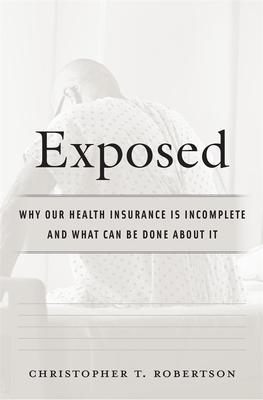

 Harvard University Press
Harvard University Press
Exposed: Why Our Health Insurance Is Incomplete and What Can Be Done about It


Key Metrics
- Christopher T Robertson
- Harvard University Press
- Hardcover
- 9780674972162
- 9.7 X 6.2 X 1.1 inches
- 1.15 pounds
- Law > Health
- English
 Secure Transaction
Secure TransactionBook Description
A sharp expos� of the roots of the cost-exposure consensus in American health care that shows how the next wave of reform can secure real access and efficiency.
The toxic battle over how to reshape American health care has overshadowed the underlying bipartisan agreement that health insurance coverage should be incomplete. Both Democrats and Republicans expect patients to bear a substantial portion of health care costs through deductibles, copayments, and coinsurance. In theory this strategy empowers patients to make cost-benefit tradeoffs, encourages thrift and efficiency in a system rife with waste, and defends against the moral hazard that can arise from insurance. But in fact, as Christopher T. Robertson reveals, this cost-exposure consensus keeps people from valuable care, causes widespread anxiety, and drives many patients and their families into bankruptcy and foreclosure.
Marshalling a decade of research, Exposed offers an alternative framework that takes us back to the core purpose of insurance: pooling resources to provide individuals access to care that would otherwise be unaffordable. Robertson shows how the cost-exposure consensus has changed the meaning and experience of health care and exchanged one form of moral hazard for another. He also provides avenues of reform. If cost exposure remains a primary strategy, physicians, hospitals, and other providers must be held legally responsible for communicating those costs to patients, and insurance companies should scale cost exposure to individuals' ability to pay.
New and more promising models are on the horizon, if only we would let go our misguided embrace of incomplete insurance.
Author Bio
Christopher Robertson joined the BU Law faculty in 2020 as a tenured professor and N. Neal Pike Scholar in Health & Disability Law. Robertson previously served as associate dean for research and innovation and professor of law at the University of Arizona.
Professor Robertson is an expert in health law, institutional design, and decision making. His wide-ranging work includes torts, bioethics, professional responsibility, conflicts of interests, criminal justice, evidence, the First Amendment, racial disparities, and corruption.
In 2019, Harvard University Press published Exposed: Why Our Health Insurance is Incomplete and What Can be Done About It. Robertson has co-edited three books, Nudging Health: Behavioral Economics and Health Law (2016), Blinding as a Solution to Bias: Strengthening Biomedical Science, Forensic Science, and Law (2016), and Innovation and Protection: The Future of Medical Device Regulation (forthcoming 2021).
Acting in legal reform movements, in 2020 Robertson undertook a yearlong project to help the board of trustees of the California State Bar reduce racial disparities in the attorney discipline system. He previously served as reporter for the Health Law Monitoring Committee of the Uniform Law Commission. For over a decade, he has served on the clinical ethics committee of an academic medical center.
Working to reform legal education, Robertson is leading the development of JD-Next, a national program designed to reduce disparities in preparation for law school and to provide a more reliable predictor of student success. In its second year, the program enrolled over 1100 students nationwide. With ETS, Robertson also conducted the first major study of the validity of the Graduate Record Exam (GRE) as an admissions test for JD programs, which led to 60+ schools, including Harvard, Yale, and BU now relying on the exam. Robertson has also pioneered legal education for undergraduates and non-lawyer professionals.
Professor Robertson has served as a visiting professor at Harvard Law School, NYU Law, and the London School of Economics, and as a visiting scholar at the Brown University Policy Lab. He is affiliated with the Petrie Flom Center for Health Care Policy, Bioethics and Biotechnology at Harvard, the NYU Langone Health Working Group on Compassionate Use and Pre-Approval Access (CUPA), and the University of Arizona’s Innovation for Justice program. Robertson’s legal practice has focused on complex litigation involving medical and scientific disputes, and he continues to work with litigators through his firm, Hugo Analytics.
Source: Boston University
Videos




Community reviews
Write a ReviewNo Community reviews